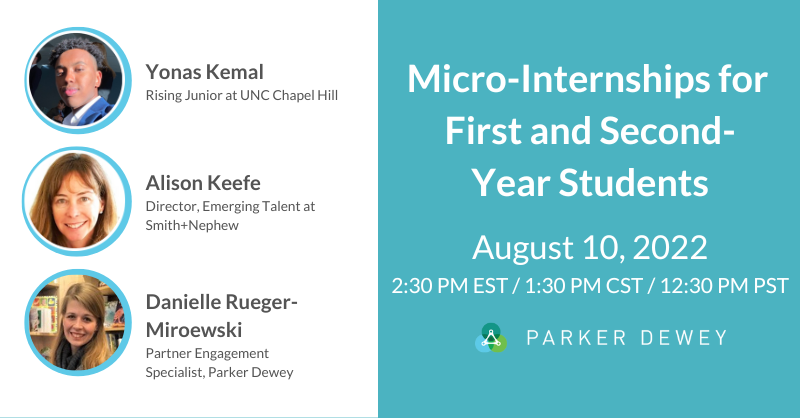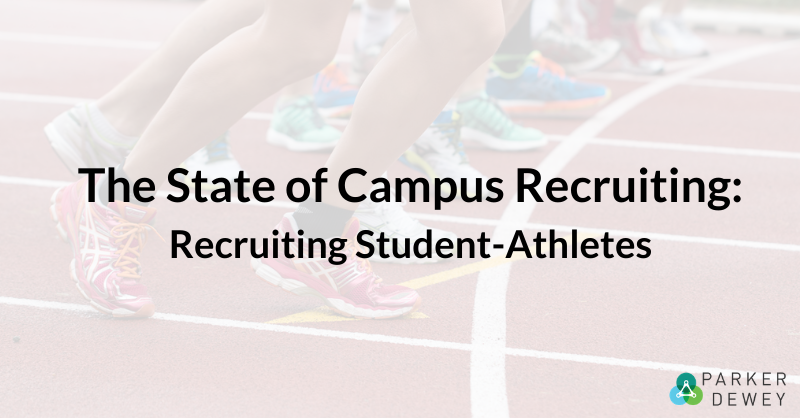
How to Supercharge Your Career Fair with Micro-Internships
College career fairs have always been pivotal events for students eager to kickstart their professional journeys. But like most strategies in the traditional recruiting playbook, they have their limitations—like only allowing for a brief, surface-level student and employer interaction. When paired with experiential recruiting strategies, however, career fairs can become a powerful tool for sourcing candidates and building brand awareness. Here’s how.
The Career Fair Today
College students today face a unique set of challenges and opportunities as they prepare to enter the job market. With industries rapidly changing, remote work becoming commonplace, and the demand for diverse skill sets increasing, traditional approaches to career preparation are no longer sufficient. In-person and virtual college career fairs, while invaluable, often offer a snapshot of potential career paths without a deep understanding of the intricacies of each role, or ample time for meaningful relationships to form between recruiters and candidates. This is where Micro-Internships come into play.
Understanding Micro-Internships
Micro-Internships are short-term, project-based work experiences that allow students to gain hands-on exposure to specific tasks and projects within various industries. These experiences can last from a few weeks to a few months, providing students with a flexible and immersive opportunity to explore potential career paths. Parker Dewey Micro-Internships are most often remote, always paid, and they offer employers a chance to assess students and recent graduates for future roles.
Integrating Career Fairs and Micro-Internships
At Parker Dewey, we’ve seen firsthand how employers have successfully integrated the two strategies. One recent example comes from Alison Keefe, Global Director of Emerging Talent at Smith+Nephew. Here’s a breakdown of the steps she took:
- Pre-event promotion: Alison posted a Micro-Internship opportunity on the platform ahead of the career fair. This early posting allowed the students attending the event to see the opportunity before they arrived. By showcasing the opportunity in advance, she created awareness and generated interest among potential candidates.
- Targeted audience: The Micro-Internship was exclusively open to students attending the specific event. This exclusivity not only made the opportunity more attractive but also ensured that the applicants were genuinely interested and aligned with the event's focus. This targeted approach increased the likelihood of finding suitable candidates.
- Branding consistency: By having the Micro-Internship opportunity posted on the platform prior to the event, students were already familiar with Smith+Nephew’s brand. This branding consistency created a stronger presence and connection between the company and the students. When students saw the same name at the event, it reinforced their recognition and trust.
- In-person engagement: At the event, Alison took advantage of the pre-established connection with potential candidates. She engaged with students by discussing the Micro-Internship opportunity and emphasized its value as a way to experience the company's industry, culture, and roles. By aligning the opportunity with students' interests, she increased the likelihood of applications.
- Encouraging applications: Alison actively encouraged students to apply for the Micro-Internship. By framing it as a great way to try out the company and role, she highlighted the unique value proposition of the opportunity. This encouragement not only generated interest but also conveyed the company's commitment to providing meaningful, compensated experiences.
- Comprehensive data collection: One key advantage of this approach was the access to applicant data. Regardless of whether students visited her booth, Alison's team had access to all applicant information. This comprehensive data collection provided insights into the level of interest, candidate profiles, and overall engagement, helping the team make informed decisions.
- Post-event follow-up: After the event, Alison's team could follow up with applicants who had expressed interest or applied for the Micro-Internship. This personalized communication allowed them to nurture relationships, answer questions, and potentially convert interested candidates into future interns or employees.
How Micro-Internships Support Career Fair Efforts
In addition to the direct benefits of sourcing potential interns, Alison's team gained several other advantages:
Talent preview: College career fairs introduce employers to a pool of potential candidates, but Micro-Internships provide a chance to see these candidates in action. By offering Micro-Internships to students met at career fairs, employers can observe their skills, work ethic, and cultural fit before committing to a full-time hire.
Skill assessment: Micro-Internships allow employers to gauge students' abilities in real-world scenarios. The practical projects completed during these experiences serve as tangible evidence of students' skills, aiding employers in assessing their suitability for specific roles.
Cultivating relationships: Traditional career fairs are often limited to brief interactions, but Micro-Internships facilitate more substantial relationships. Employers can interact with students over the course of a project, fostering mentorship opportunities and cultivating relationships that could evolve into long-term employment.
Recruitment efficiency: For employers spending valuable resources on traveling to career fairs, it’s crucial to make the effort count! Micro-Internships enable employers to streamline their recruitment process. Rather than relying solely on resumes and interviews, employers can evaluate candidates' performance through project outcomes, making the hiring process more efficient and effective.
Building a pipeline: Establishing Micro-Internship programs can serve as a talent pipeline for future hiring needs. Successful Micro-Interns can be considered for full-time positions upon graduation, reducing the time and resources spent on external recruitment.
The synergy between Micro-Internships and college career fairs forms a powerful combination for recruiters looking to get the most out of their efforts, while also maximizing the benefits for students on their journey to professional success. While college career fairs initiate connections and introduce students to potential employers, Micro-Internships offer invaluable practical experiences that deepen their understanding of their chosen fields. By integrating Micro-Internships into college career fair strategies, students gain an edge in the competitive job market, armed with both networking connections and relevant skills.




